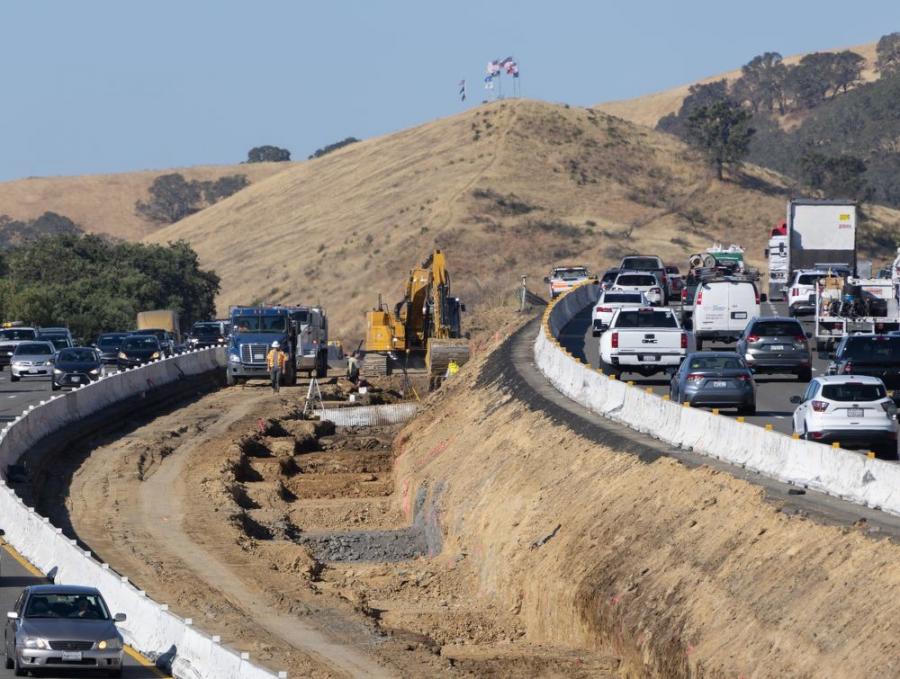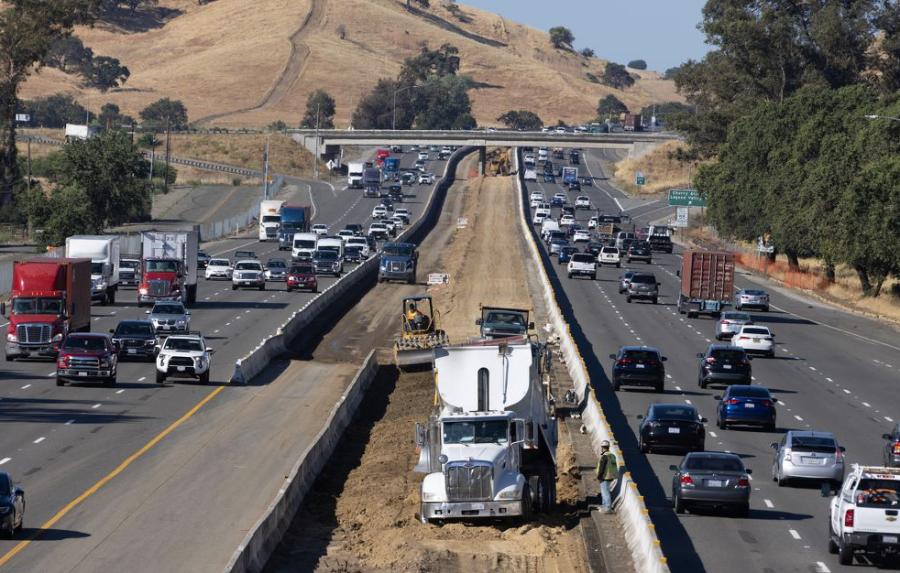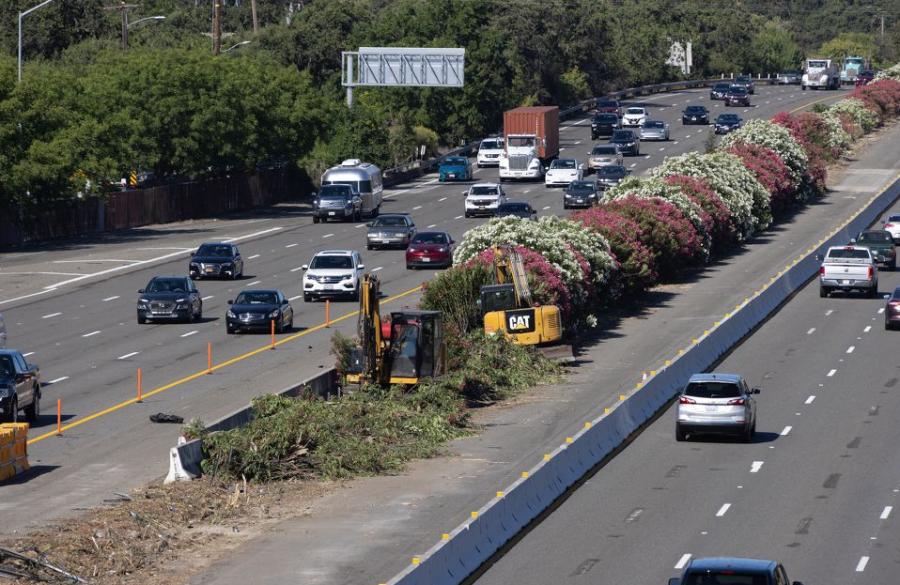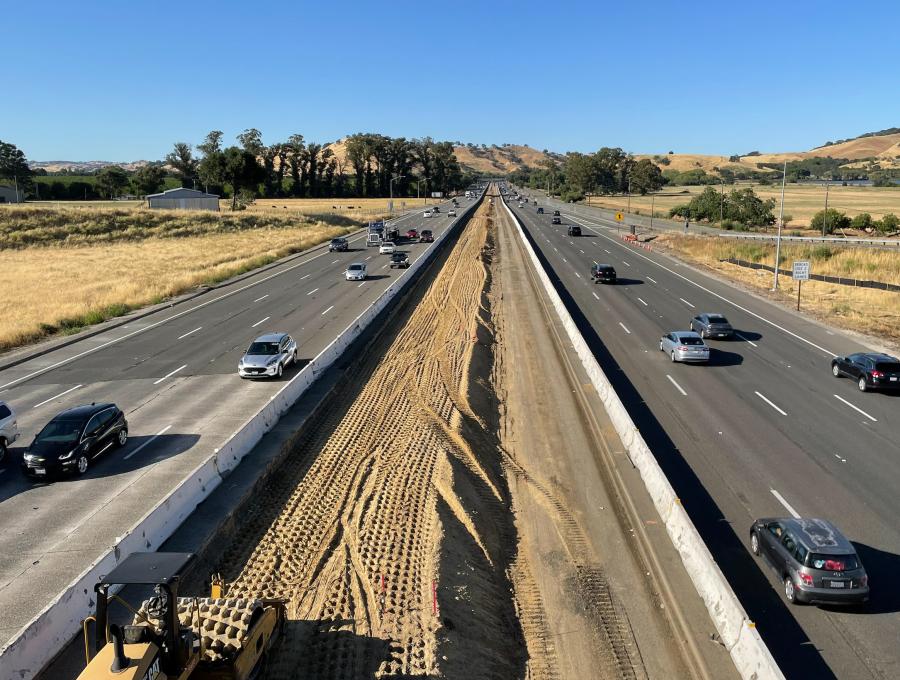Bakersfield-based contractor O.C. Jones & Sons Inc. are creating 18 mi. of express lanes — one eastbound and one westbound — as part of the $244 million Solano I-80 Express Managed Lanes Project.
(Photo courtesy of Solano Transportation Authority.)
O.C. Jones & Sons Inc. began work on the California Department of Transportation (Caltrans) and the Solano Transportation Authority's (STA) three-year, $244 million Solano I-80 Express Managed Lanes Project that is adding express lanes on Interstate 80 between Red Top Road in Fairfield and the Leisure Town Road in Vacaville just east of the I-80/I-580 interchange.
The Bakersfield-based contractor, which specializes in site grading, excavation, asphalt paving and underground utilities, is progressing with work on time and on budget.
Upon completion, two new, 18-mi. express lanes —one eastbound and one westbound — will be built through central Solano County, bringing congestion relief and encouraging transit use and carpooling in the busy corridor, according to Caltrans District 4 Public Information Officer Pedro Quintana.
"Ultimately, the express lane network will expand north to meet the Caltrans District 3 express lanes in Yolo County," said Daryl Halls, executive director of the Solano Transportation Authority. "It also will lead to a better flow of recreational travel between Lake Tahoe, San Francisco and the North Bay Wine Country."
In addition to the new express lanes, the initiative is converting existing carpool lanes into express lanes
"Caltrans and crews will build 10 miles of new express lanes in the median of I-80 between Airbase Parkway in Fairfield and Nut Tree Overcrossing, just west of the I-505 Interchange," said Caltrans' David Hafner. "Later, workers will convert eight miles of bi-directional carpool lanes into express lanes between Red Top Road and Airbase Parkway. The joined facilities will create two 18-mile-long express lanes that will vastly improve transit travel times, particularly because the stretch between Air Base Parkway and Leisure Town Road Nut Tree Overcrossing is not currently served by carpool lanes."
Construction Progress/Challenges
"Crews are working day and night shifts," said Casaundra Lograsso, a Caltrans senior construction engineer. "O.C. Jones has sufficient space to store materials, equipment and set up field offices. So far, no soil, water or utility issues have been encountered."
Road work is ongoing in multiple areas 24/7.
"The greatest challenge is working on a congested freeway," said Lograsso. "Prior to the excavation, the contract required clearing and grubbing, which required the Oleanders to be removed in the median. In addition, due to the culturally sensitive archeological area, the Yocha Dehe Tribe representative was present and areas were cleared for the contractor to continue with excavations in these sensitive areas. The majority of the excavation work is in the median and challenge is for entering and exiting the area onto the congested freeway."
The excavated material is being placed in its final location as it is being excavated.
As noted, crews are working at multiple locations.
"This is due to an aggressive project schedule to allow the opening of the express lanes as soon as possible for the travelling public," said Lograsso. "One critical item for the project to be successful is the fact the PG&E was instrumental in providing utility drawings well in advance in order for the project to meet its goals. The PG&E representative has coordinated closely with the Caltrans construction team.
"Once the new lanes are built," added Lograsso, "we will then cold plane and overlay the entire highway with open grade AC. This will take around four months."
The section of the new lane in the median is 2.75-ft. thick.
"Work is being constructed in various locations, some on the shoulder, in the median, bridges and off/on ramps," Lograsso said.
Key pieces of equipment being used are excavators, backhoes, boring machines, cranes for bridge work and paving machines.
Project's Necessity
"The project will combat growing traffic congestion in the Fairfield-Vacaville corridor," Hafner said. "At Air Base Parkway, the busiest location, about 215,000 vehicles pass through daily. O.C. Jones is working on a stretch of freeway that hasn't been widened since 1973. The project comes at a welcome time, as Solano County rests between two mega regions, the Bay Area and the greater Sacramento area. Traffic is projected to increase by 35 percent by 2040."
In 2016, the county's population came in at 438,681 and it is expected to grow to 547,387 by 2040.
Currently, this section of highway experiences 70 vehicle hours of congested during peak hours.
"I-80 connects the Northern California mega-region and Solano can't thrive with a clogged major artery," said Halls. "Major congestion on I-80 prevents people and freight from moving efficiently, impacts reliable express transit service between Solano County, Bay Area, and Sacramento regions [SolanoExpress] and impedes emergency vehicle access. Solano County experiences about 830,000 VHD [vehicle hours of delay] annually and I-80 slows to less than 30 mph from 2 p.m. until after 6 p.m."
According to Caltrans, the express lanes will encourage carpooling and transit use, improve travel times and travel reliability, reduce congestion in the corridor, maximize efficiency by using modern technology and upgrade the pavement and striping in the corridor.
The value of freight from the SF Area to Sacramento — both truck and rail — is projected to more than double between 2025 and 2040. In 2012 it was valued at $7.29 billion and in 2025 it is expected to reach $13.3 billion, by 20240, peak at $3.9 billion.
However, the opening of new ramps on the ongoing 80/680/12 project several miles to the west has already provided some congestion relief to the vicinity I-80 Corridor. The project will be completed in late fall 2022.
More than half of the funding for the project, $123 million, was awarded by the California Transportation Commission from the Trade Corridor Enhancement Program of Senate Bill 1 (SB 1), the Road Repair and Accountability Act of 2017. The remainder is based on revenues from Regional Bridge Tolls and a 10 year advancement by the STA of the county's State Transportation Improvement Program (STIP) funding.
The amounts of materials steel, concrete, asphalt, earth and rock and other materials that are being excavated and demolished and brought in are still being tabulated and finalized. CEG
Irwin Rapoport
A journalist who started his career at a weekly community newspaper, Irwin Rapoport has written about construction and architecture for more than 15 years, as well as a variety of other subjects, such as recycling, environmental issues, business supply chains, property development, pulp and paper, agriculture, solar power and energy, and education. Getting the story right and illustrating the hard work and professionalism that goes into completing road, bridge, and building projects is important to him. A key element of his construction articles is to provide readers with an opportunity to see how general contractors and departments of transportation complete their projects and address challenges so that lessons learned can be shared with a wider audience.
Rapoport has a BA in History and a Minor in Political Science from Concordia University. His hobbies include hiking, birding, cycling, reading, going to concerts and plays, hanging out with friends and family, and architecture. He is keen to one day write an MA thesis on military and economic planning by the Great Powers prior to the start of the First World War.
Read more from Irwin Rapoport here.
Today's top stories



















